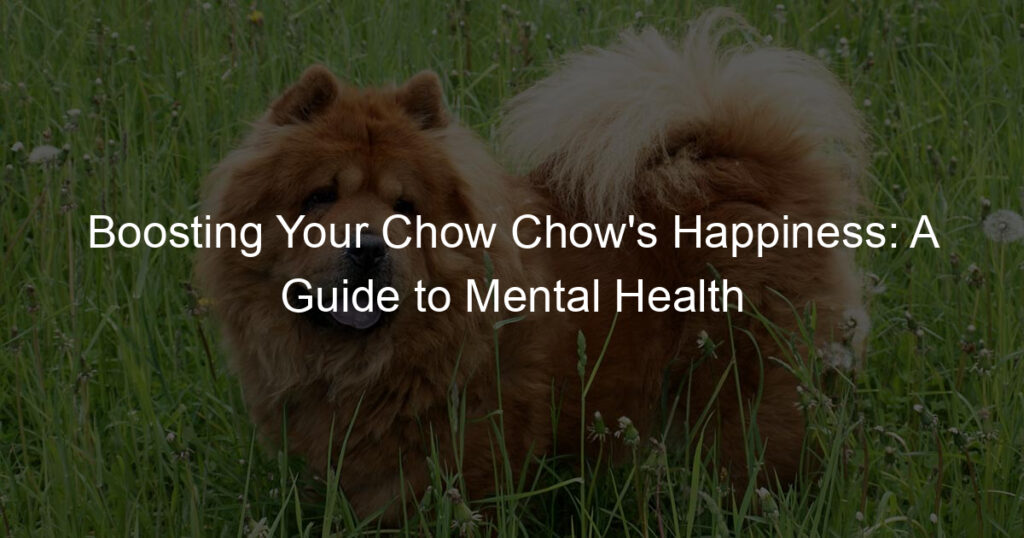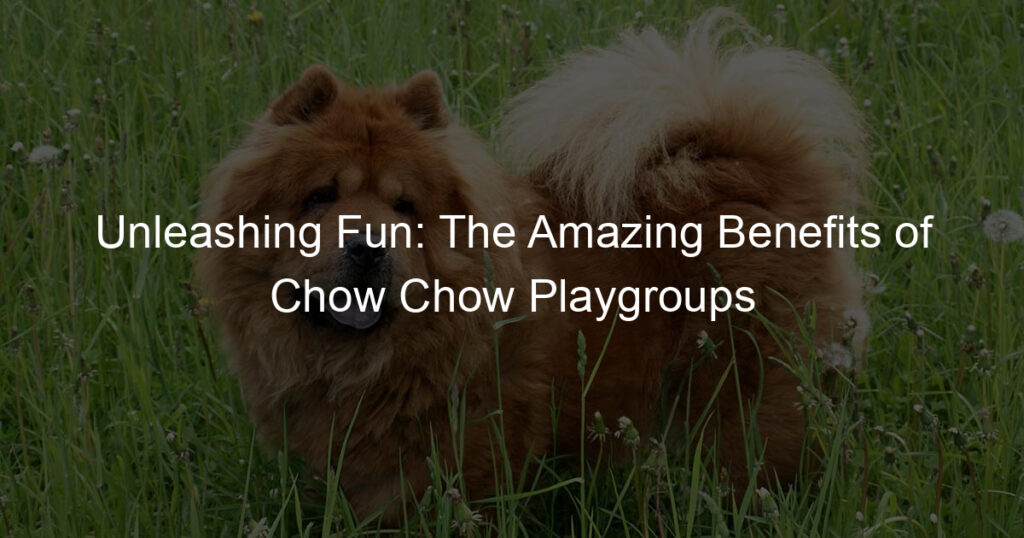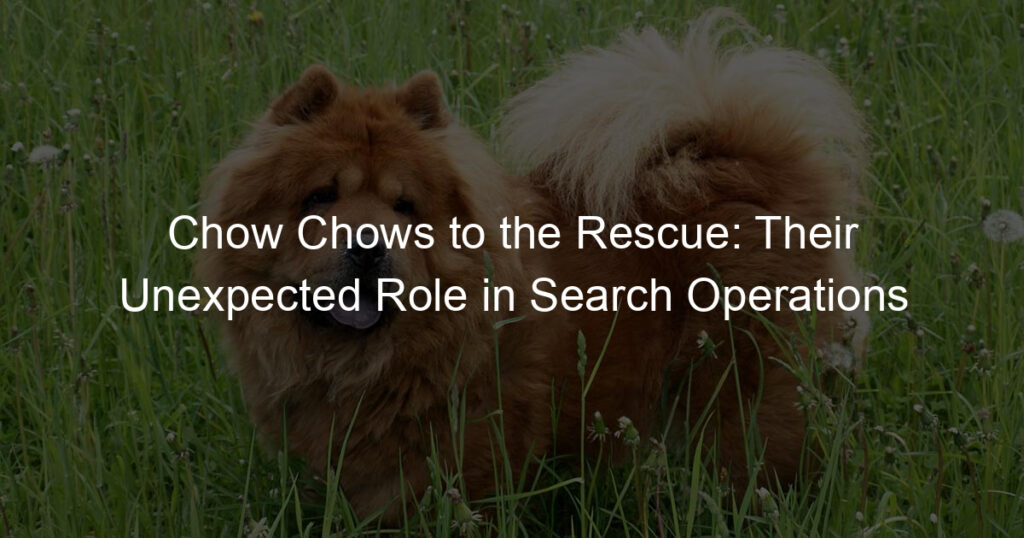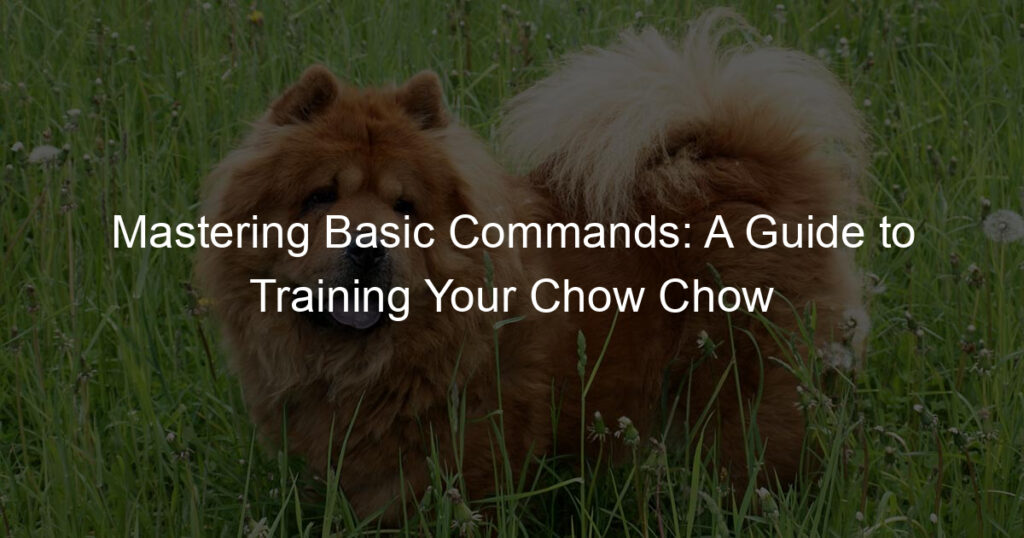
Introduction to Chow Chow Mental Health
Just like humans, dogs too have mental health needs. It’s crucial to understand and care for these needs to ensure your furry friend leads a happy and healthy life. This is especially true for Chow Chows, a breed known for their unique temperament and personality. In this section, we’ll delve into the importance of mental health in dogs and specifically, the mental health of Chow Chows.
Often, when we think of a dog’s health, we focus on their physical well-being: their diet, exercise, and regular vet check-ups. However, mental health is just as important. A dog’s mental health affects their behavior, mood, and overall quality of life. Dogs with poor mental health can show signs of anxiety, depression, and other behavioral issues. They may become withdrawn, aggressive, or exhibit changes in appetite or sleep patterns. Therefore, understanding and addressing your dog’s mental health is vital to their overall well-being.
Chow Chows are an independent and sometimes aloof breed. They can be reserved, even with their owners, and are often wary of strangers. This doesn’t mean they don’t need mental stimulation and social interaction. In fact, Chow Chows require regular mental exercise to stay happy and healthy. Without it, they can become bored, anxious, or even depressed. It’s also important to note that Chow Chows can be stubborn, so training and socialization should start at an early age to ensure they grow into well-adjusted adults.
In the following sections, we’ll explore more about Chow Chow behavior, how to nurture their mental health, and ways to improve it. We’ll also provide tips on caring for your Chow Chow’s mental health, so you can ensure they lead a happy and fulfilling life.
Understanding Chow Chow Behavior
Chow Chows are unique creatures with their own set of behaviors and mannerisms. Understanding these behaviors is key to ensuring their mental health and overall happiness. One of the most important aspects of understanding Chow Chow behavior is recognizing signs of mental health issues.
Recognizing Signs of Mental Health Issues
Like humans, dogs can also experience mental health issues. It’s crucial to recognize the signs early to provide them with the necessary care and support. Here are some signs you should look out for in your Chow Chow:
- Changes in appetite: One of the first signs of mental health issues in dogs is a change in their eating habits. If your Chow Chow is eating less than usual or showing a lack of interest in food, it could be a sign of stress or anxiety.
- Decreased interest in play: Chow Chows are known for their playful nature. A decrease in their interest in play or a lack of enthusiasm during playtime could indicate that they are not feeling their best mentally.
- Excessive sleeping: While it’s normal for dogs to sleep a lot, excessive sleeping could be a sign of depression in dogs. If your Chow Chow is sleeping more than usual and seems lethargic even after a good night’s sleep, it might be time to consult a vet.
Recognizing these signs early can make a huge difference in your Chow Chow’s mental health. Remember, your furry friend relies on you to understand their needs and provide them with the care they need. So, keep an eye out for these signs and take action if you notice any changes in their behavior.
Understanding Normal Chow Chow Behavior
Chow Chows are unique dogs with distinct behaviors that set them apart from other breeds. Understanding these behaviors can help you better care for your Chow Chow and ensure their mental health. Let’s delve into some of the unique traits of Chow Chows and what their common behaviors mean.
- Chow Chow’s Unique Traits
Chow Chows are known for their lion-like appearance and blue-black tongues. But their uniqueness goes beyond their physical attributes. They are often described as cat-like due to their aloof and independent nature. They are not overly affectionate and prefer to be in their own space. However, they are extremely loyal to their families and can be protective if they sense a threat.
Chow Chows are also intelligent and can be stubborn at times. This can make training a bit challenging, but with patience and consistency, they can learn to follow commands. They are not high-energy dogs, but they do require regular exercise to keep them healthy and prevent boredom.
- Common Behaviors and What They Mean
Chow Chows exhibit several common behaviors that are important to understand. For instance, they are known to be quite reserved and may not respond enthusiastically to strangers. This is a normal behavior for this breed and is not a sign of aggression or fear.
Chow Chows also have a strong instinct to protect their territory. If they bark or growl when someone approaches their home, it’s their way of warning the intruder to stay away. However, with proper socialization, they can learn to be more accepting of strangers.
Another common behavior is their tendency to be stubborn. If your Chow Chow refuses to follow a command, it’s not because they don’t understand you. It’s their way of asserting their independence. It’s important to be patient and consistent in your training methods.
Understanding these behaviors can help you provide the best care for your Chow Chow and nurture their mental health. Remember, every Chow Chow is unique and may not exhibit all these behaviors. It’s important to spend time with your dog and learn their individual personality and behavior patterns.
Nurturing Chow Chow Mental Health
Ensuring the mental health of your Chow Chow is a vital part of pet ownership. A significant aspect of this involves creating a safe and comfortable environment for your pet.
Creating a Safe and Comfortable Environment
Just like humans, dogs also need a safe and comfortable environment to thrive. This is particularly true for Chow Chows, a breed known for their independent and sometimes aloof nature. Let’s delve into the importance of a safe space and how to create a comfortable home environment for your Chow Chow.
-
- Importance of a safe space
A safe space for your Chow Chow is more than just a physical area. It’s a place where they can retreat when they’re feeling stressed or anxious. It’s an area where they feel secure and protected. This sense of safety is crucial for their mental health, as it reduces anxiety and stress levels.
-
- Tips for creating a comfortable home environment
Creating a comfortable home environment for your Chow Chow doesn’t have to be complicated. Here are a few tips:
-
- Provide a designated area for your Chow Chow, such as a dog bed or crate, where they can retreat when they need some alone time.
- Keep the environment calm and quiet. Loud noises and sudden movements can stress your Chow Chow.
- Ensure your home is clean and free from hazards that could harm your Chow Chow.
- Provide toys and activities that can keep your Chow Chow mentally stimulated when they’re alone.
Remember, a comfortable and safe environment plays a significant role in nurturing your Chow Chow’s mental health. By following these tips, you can help ensure your pet feels secure and loved in their home.
Providing Adequate Exercise and Mental Stimulation for Chow Chow
Exercise and mental stimulation are crucial for the overall well-being of your Chow Chow. These activities not only keep your pet physically fit but also ensure that they remain mentally sharp. Let’s delve into some recommended physical activities and mental stimulation activities for your Chow Chow.
-
- Recommended Physical Activities
Chow Chows are known for their strength and endurance. They require regular exercise to maintain their health and happiness. Here are some recommended physical activities:
-
-
- Walks: A daily walk of about 30 minutes to an hour is ideal for a Chow Chow. This not only provides them with the necessary physical exercise but also allows them to explore their surroundings.
- Playtime: Engage your Chow Chow in play activities such as fetch or tug-of-war. These games can be a fun way for them to expend energy and interact with you.
- Swimming: If your Chow Chow enjoys water, swimming can be a great low-impact exercise. Always supervise your pet during swim sessions to ensure their safety.
- Mental Stimulation Activities
-
Mental stimulation is equally important for your Chow Chow’s health. It helps prevent boredom and destructive behaviors. Here are some activities that can stimulate your pet’s mind:
-
- Puzzle Toys: Puzzle toys that dispense treats can keep your Chow Chow engaged for hours. They challenge your pet to figure out how to get the treat, stimulating their problem-solving skills.
- Training Sessions: Regular training sessions not only teach your Chow Chow new commands but also provide mental stimulation. Remember to keep the sessions short and fun.
- Hide and Seek: This game can be a fun way to engage your Chow Chow’s sense of smell and problem-solving skills. Hide treats around the house and let your pet find them.
In conclusion, providing your Chow Chow with adequate exercise and mental stimulation can significantly contribute to their overall health and happiness. Remember to keep these activities fun and engaging for your pet. Your efforts will undoubtedly be rewarded with a happy and healthy Chow Chow.
Improving Chow Chow’s Mental Health
Improving your Chow Chow’s mental health is a crucial aspect of their overall well-being. One of the most effective ways to enhance their mental health is through training and socialization.
Training and Socialization
Training and socialization play a significant role in improving the mental health of your Chow Chow. They not only help in shaping their behavior but also contribute to their happiness and well-being.
-
- Benefits of Training and Socialization
Training and socialization have numerous benefits for your Chow Chow. They help in reducing anxiety and stress, improving their confidence, and enhancing their ability to interact with other pets and people. According to a study, dogs that are well socialized are less likely to develop behavioral problems in the future.
-
- Effective Training Methods for Chow Chow
Chow Chows are intelligent and independent dogs. Therefore, they respond well to positive reinforcement training methods. Here are some effective training methods:
-
- Consistency: Be consistent with your commands and rewards. This helps your Chow Chow understand what you expect from them.
- Positive Reinforcement: Reward your Chow Chow for good behavior. This can be in the form of treats, praise, or playtime.
- Patient Training: Training should be a fun and positive experience for your Chow Chow. Avoid harsh methods as they can lead to fear and anxiety.
Remember, improving your Chow Chow’s mental health is a continuous process. It requires patience, consistency, and understanding. With the right training and socialization, you can help your Chow Chow lead a happy and healthy life.
Diet and Nutrition
When it comes to improving the mental health of your Chow Chow, diet and nutrition play a significant role. Let’s delve into the details.
- Role of diet in mental health
A balanced diet is not only essential for a Chow Chow’s physical health but also their mental well-being. The food your Chow Chow consumes can directly impact their mood and behavior. For instance, a diet rich in Omega-3 fatty acids can help improve their cognitive functions. Similarly, foods high in tryptophan, a type of amino acid, can boost serotonin levels in the brain, promoting a sense of calm and happiness.
- Recommended diet for Chow Chow
Feeding your Chow Chow a balanced and nutritious diet is crucial for their mental health. Here are some recommendations:
| Food Type | Benefits |
|---|---|
| High-quality commercial dog food | Provides a balanced diet with all the necessary nutrients |
| Fruits and vegetables (e.g., carrots, apples) | Rich in vitamins and fiber, promoting overall health |
| Lean meats (e.g., chicken, turkey) | Provides essential proteins and amino acids |
| Fish (e.g., salmon, sardines) | High in Omega-3 fatty acids, supporting brain health |
Remember, every Chow Chow is unique, and their dietary needs may vary based on their age, size, and health condition. Always consult with your vet before making significant changes to your Chow Chow’s diet.
Caring for Chow Chow’s Mental Health
One of the key aspects of caring for your Chow Chow’s mental health is ensuring they have regular vet check-ups. These visits are not only essential for their physical health but also their mental well-being.
Regular Vet Check-ups
Regular vet check-ups play a significant role in maintaining your Chow Chow’s mental health. Let’s delve into why these visits are important and what you can expect during a mental health check-up.
-
- Importance of regular vet visits
Regular vet visits are crucial for your Chow Chow’s overall health. These check-ups allow the vet to detect any early signs of mental health issues such as anxiety or depression. Early detection can lead to timely treatment, preventing the condition from worsening. Moreover, regular vet visits can also help in identifying any changes in your dog’s behavior that may indicate a mental health problem.
-
- What to expect during a mental health check-up
During a mental health check-up, your vet will evaluate your Chow Chow’s behavior, mood, and overall demeanor. They may ask you questions about any changes in your dog’s behavior, eating habits, or sleep patterns. The vet may also observe your dog’s interaction with you and others to assess their social behavior. Based on these observations, the vet can diagnose any potential mental health issues and suggest appropriate treatment or behavioral modifications.
In conclusion, regular vet check-ups are an integral part of caring for your Chow Chow’s mental health. They not only help in early detection of mental health issues but also provide guidance on how to manage these conditions effectively. Remember, a healthy Chow Chow is a happy Chow Chow!
Building a Strong Bond with Your Chow Chow
Creating a strong bond with your Chow Chow is not just about companionship. It’s about fostering a relationship that enhances both your mental health and that of your pet. Let’s explore the benefits of this bond and some tips on how to strengthen it.
-
- Benefits of a Strong Human-Dog Bond
Having a strong bond with your Chow Chow offers a myriad of benefits:
-
-
- Improved Mental Health: Studies show that pet owners often have lower stress levels and are less likely to suffer from depression.
- Increased Physical Activity: Walking and playing with your Chow Chow can help keep you active and healthy.
- Enhanced Social Skills: Owning a dog like the Chow Chow can improve your social skills, as it often leads to interactions with other dog owners.
- Boosted Immunity: Believe it or not, exposure to a dog can help strengthen your immune system!
- Tips for Building a Strong Bond
-
Building a strong bond with your Chow Chow doesn’t happen overnight. It requires patience and consistency. Here are some tips:
-
- Consistent Training: Regular training sessions not only teach your Chow Chow good behavior but also help to establish trust.
- Quality Time: Spend quality time with your Chow Chow. This could be through play, grooming, or simply sitting together.
- Positive Reinforcement: Always reward your Chow Chow for good behavior. This can be through treats, praise, or extra playtime.
- Respect Their Space: Just like humans, dogs need their own space. Respect this, and it will help build trust.
In conclusion, building a strong bond with your Chow Chow is beneficial for both of you. It enhances your mental health, keeps you physically active, and can even boost your immunity. So, spend quality time with your Chow Chow, train them consistently, reward good behavior, and respect their space. You’ll be amazed at the strong bond you’ll build!
Conclusion: Ensuring Your Chow Chow’s Happiness
As we conclude our discussion on the mental health of your Chow Chow, let’s recap the key points and share some final thoughts on how to ensure your furry friend’s happiness.
-
- Recap of key takeaways
Understanding and nurturing your Chow Chow’s mental health is crucial for their overall well-being. Remember:
-
-
- Chow Chows are intelligent and sensitive dogs that require mental stimulation and social interaction.
- Consistent training, positive reinforcement, and a stable environment can significantly improve your Chow Chow’s mental health.
- Regular exercise and a balanced diet are essential for your Chow Chow’s physical and mental health.
- Regular vet check-ups can help detect any potential mental health issues early.
- Final thoughts on Chow Chow mental health
-
Ensuring your Chow Chow’s happiness is not a one-time task, but a continuous process. It involves understanding their unique personality, providing them with a loving and stable environment, and meeting their physical and mental needs. Remember, a happy Chow Chow is not just a pet, but a loyal friend and a cherished member of your family.
As the famous saying goes, “A dog is the only thing on earth that loves you more than he loves himself.” Let’s make sure we reciprocate that love by taking good care of our Chow Chows’ mental health.














